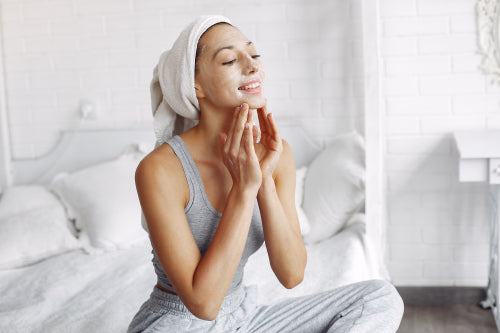The Role of Relaxation in Skin Health

Quick Listen:
Stress is often an inevitable part of life. Whether it's the demands of work, family, or personal expectations, stress can take a significant toll on both our mental and physical health. However, what many people don't realize is that stress also has a profound impact on our skin. In fact, research has shown that stress can lead to various skin problems, such as inflammation, acne, premature aging, and more. This is where relaxation plays a vital role in maintaining healthy skin.
In this blog post, we will explore how relaxation techniques, such as meditation, deep breathing, and quality sleep, can improve skin health by counteracting the harmful effects of stress. We will also discuss the underlying mechanisms that connect stress to skin issues and the science behind why relaxation is crucial for achieving and maintaining glowing, youthful skin.
The Skin-Stress Connection: How Stress Affects Skin Health
Before diving into the role of relaxation in skin health, it is essential to understand how stress affects the skin. The relationship between stress and skin health is complex, but it can be broken down into a few key mechanisms:
1. Increased Inflammation
When we experience stress, our bodies release stress hormones, particularly cortisol. This hormone is a natural response to stress and helps the body manage immediate threats or challenges. However, chronically elevated cortisol levels can have negative effects on the body, including the skin. One of the key ways stress impacts the skin is by promoting inflammation.
Inflammation is a key factor in various skin conditions, including acne, eczema, and psoriasis. Stress-induced inflammation can disrupt the skin's natural barrier, leading to increased sensitivity, redness, and irritation. This can exacerbate existing skin conditions and even trigger the development of new ones.
2. Impaired Skin Barrier Function
The skin barrier is the outermost layer of the skin that serves as a protective shield against external aggressors like bacteria, pollution, and harmful UV rays. Stress can impair the function of the skin barrier, making it more vulnerable to damage and dehydration. This disruption can lead to dry, flaky, and irritated skin, as well as an increased risk of infection.
Moreover, a weakened skin barrier also compromises the skin's ability to retain moisture, leading to a dull, lackluster complexion. The skin becomes more prone to the harmful effects of environmental factors, which can accelerate signs of aging.
3. Increased Oil Production and Breakouts
Stress can trigger an increase in oil production, which often leads to clogged pores and acne breakouts. Elevated cortisol levels stimulate the sebaceous glands to produce more sebum, an oily substance that can mix with dead skin cells and dirt, blocking the pores. When pores are blocked, acne-causing bacteria thrive, leading to inflammation and the formation of pimples, blackheads, and cysts.
For individuals prone to acne or other inflammatory skin conditions, stress can be a major trigger. Therefore, managing stress levels is essential in preventing and reducing breakouts.
4. Premature Aging
Chronic stress not only affects the skins appearance but also accelerates the aging process. High cortisol levels can break down collagen and elastin, two essential proteins that give the skin its firmness and elasticity. As collagen production decreases, the skin becomes more prone to sagging, fine lines, and wrinkles. Additionally, stress can impair the skin's ability to repair itself, making it more susceptible to the damaging effects of UV exposure and environmental pollution.
The Power of Relaxation: How Stress Relief Improves Skin Health
Now that we understand the negative effects of stress on skin health, let's take a closer look at how relaxation techniques can counteract these effects and promote healthier skin.
1. Meditation and Mindfulness
Meditation and mindfulness practices have long been known for their ability to reduce stress, but they also offer significant benefits for the skin. Research has shown that meditation can lower cortisol levels, decrease inflammation, and improve overall skin health. By promoting a state of relaxation, meditation allows the body to shift from the fight-or-flight response to a more balanced, restorative state.Incorporating meditation into your daily routine can help reduce the negative impact of stress on the skin by calming the mind and promoting relaxation. Even just a few minutes of deep breathing or mindful awareness each day can significantly reduce cortisol levels and improve skin health over time.
2. Deep Breathing Exercises
Breathing exercises, such as deep diaphragmatic breathing, have a powerful effect on reducing stress and promoting relaxation. When we are stressed, our breathing becomes shallow and rapid, which can further activate the stress response. However, deep breathing encourages a slower, more controlled breath, which activates the parasympathetic nervous system, helping the body relax.
By engaging in deep breathing exercises regularly, you can lower cortisol levels and decrease skin inflammation. Additionally, deep breathing helps improve circulation, which can enhance the delivery of nutrients to the skin, promoting a healthy complexion.
3. Quality Sleep
Adequate sleep is crucial for overall health, and it plays a significant role in skin health as well. During sleep, the body undergoes repair and regeneration processes, including the production of collagen and other skin-rejuvenating compounds. However, poor sleep, often exacerbated by stress, can lead to increased inflammation, dark circles under the eyes, and a dull complexion.
In addition to promoting healing, sleep also helps to restore the skin's moisture balance, allowing the skin to retain hydration and maintain its natural glow. Therefore, ensuring that you get 7-9 hours of quality sleep each night is one of the most effective ways to support skin health and reduce the effects of stress.
4. Regular Exercise
Physical activity is not only beneficial for overall health but also for stress management. Exercise helps to release endorphins, the bodys natural mood elevators, which can counteract the effects of stress. Furthermore, exercise improves blood circulation, which helps deliver oxygen and nutrients to the skin, promoting a healthy complexion.
Although exercise can induce some temporary redness in the skin due to increased blood flow, regular physical activity can contribute to a clearer, more radiant complexion in the long term by reducing stress and improving skin health.
Embrace Relaxation for Radiant Skin
The relationship between stress and skin health is undeniable, and understanding this connection is crucial for maintaining a glowing, youthful complexion. Stress can lead to inflammation, impaired skin barrier function, acne breakouts, and premature aging, all of which can take a toll on your skin.
By embracing relaxation techniques like meditation, deep breathing, and getting enough sleep, you can significantly reduce the impact of stress on your skin. These practices help lower cortisol levels, decrease inflammation, and promote overall skin healing, ultimately leading to healthier, more radiant skin.
Incorporating these relaxation techniques into your daily routine doesnt just benefit your skin; it also improves your overall well-being. So, take a deep breath, unwind, and prioritize relaxation for both your mind and your skinyour complexion will thank you.
You may also be interested in: Lit! Daily Serum Desavery
Tired of putting harsh chemicals and synthetic ingredients in your skin? Discover the gentle, plant-powered, and cruelty-free skincare routine from Desavery. Meticulously crafted for every skin type, our day-and-night formulas nourish and revitalize, giving your skin a healthy, radiant glow. Join the community of those whove found a natural, effective solution for their skincare needs. Let your glowy skin tell a story of health and natural beauty. Shop Desavery Now!
Powered by flareAI



